Cornelius Green
b. December 12th, 1928 in Donaldsonville (Louisiana)
d. April 23rd, 1995 in Gonzales (Louisiana)
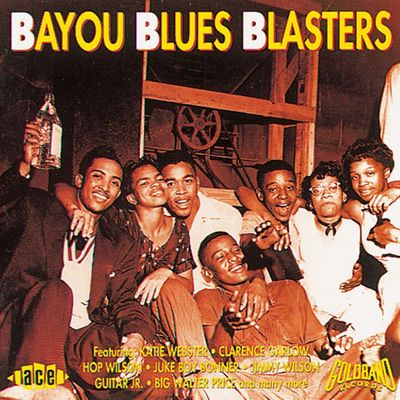
BAYOU BLUES BLASTERS
Ace
1956
Dans cette superbe anthologie, on trouve le premier titre enregistré par Cornelius Green (pas encore Lonesome Sundown) pour Goldband : "It ain't right". Sur ce morceau, il est accompagné par Clarence Garlow à l'accordéon. Le titre n'avait jamais été édité avant cette parution CD.
In this superb anthology, we find the first title recorded by Cornelius Green (not yet Lonesome Sundown) for Goldband : "It ain't right". On this track, he is accompanied by Clarence Garlow on accordion. The title had never been issued before this CD release.
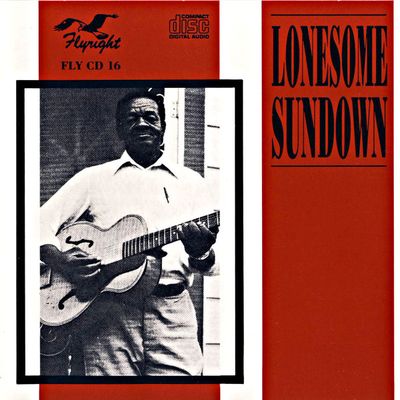
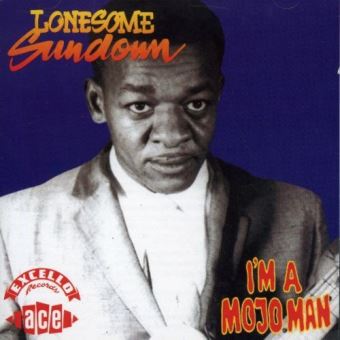
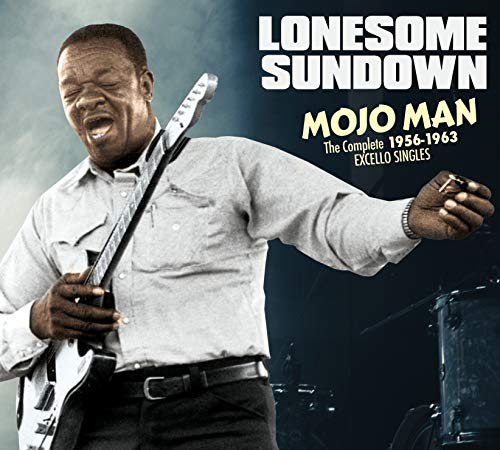
LONESOME SUNDOWN
Flyright
I'M A MOJO MAN
Ace
MOJO MAN
Soul Jam
September 1956 - May 1964
Vers 1946, il rejoint la Nouvelle Orléans et trouve un travail de porteur. Deux ans plus tard, il revient dans sa ville natale Donaldsonville. Il travaille dans les champs le jour et apprend la guitare la nuit avec son cousin. En 1953, Cornelius s'installe à Port Arthur et travaille dans une raffinerie. Deux ans plus tard, sa carrière musicale commence vraiment quand il intègre le groupe Clifton Chenier comme second guitariste (le premier guitariste est son ami Phillip Walker). Il reste avec Chenier environ une année avant de se marier puis démarrer une carrière solo enregistrant pour le producteur J.D. Miller dès septembre 1956. Entre 1956 et 1964, Lonesome Sundown (le curieux pseudonyme que lui donne Miller) enregistre substantiellement pour le producteur louisianais une oeuvre emblématique du Swamp Blues : voix trainante, rythme hypnotique, jeu de guitare fluide. De nombreux titres remarquables voient le jour : "I'm a mojo man", "Lonesome lonely blues", "Learnt to treat me better", "Sundown blues", "I'm a young man", "I woke up cryin'", "I'm a samplin' man", "My home is a prison" et l'instrumental "Lonesome whistler". Lors de ces magnifiques séances, il est accompagné de superbes sidemen comme "Lazy" Lester, John "Fats" Perrodin, Clarence "Jockey" Etienne, Katie Webster, Lionel Torrence (alias Lionel Prevost). En février 1965, il abandonne soudainement la musique pour la religion et devient maçon.
Around 1946, he moved to New Orleans and found a job as a porter. Two years later, he returned to his hometown Donaldsonville. He works in the fields during the day and learns the guitar the night with his cousin. In 1953, Cornelius moved to Port Arthur and worked in a refinery. Two years later, his musical career really began when he joined the Clifton Chenier band as second guitarist (the first guitarist is his friend Phillip Walker). He stayed with Chenier for about a year before getting married and then starting a solo career recording for producer J.D. Miller in september 1956. Between 1956 and 1964, Lonesome Sundown (the curious pseudonym given to him by Miller) substantially recorded for the Louisiana producer an emblematic work of the Swamp Blues : drawling voice, hypnotic rhythm, fluid guitar playing. Many remarkable titles see the light of the day : "I'm a mojo man", "Lonesome lonely blues", "Learnt to treat me better", "Sundown blues", "I'm a young man", "I woke up cryin'", "I'm a samplin' man", "My home is a prison" and the instrumental "Lonesome whistler". During these magnificent sessions, he is accompanied by superb sidemen like "Lazy" Lester, John "Fats" Perrodin, Clarence "Jockey" Etienne, Katie Webster, Lionel Torrence (aka Lionel Prevost). In february 1965, he suddenly abandoned music for religion and became a construction worker.
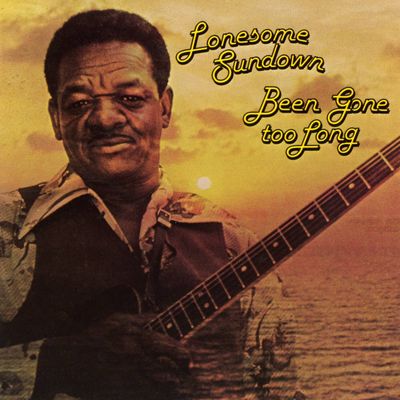
BEEN GONE TOO LONG
Joliet
Alligator
Sonet
P-Vine
Hightone
April 1977
Sous l'impulsion de son ami Phillip Walker, Lonesome Sundown accepte de reprendre sa guitare et enregistre un remarquable album pour le label Joliet. Cet album est produit par Bruce Bromberg et Dennis Walker. Ses capacités de bluesman apparaissent toujours au zénith. Il y a de nombreuses perles qui méritent l'écoute : "One more night", "Louisiana lover man", "Black cat bone", "I betcha", "If you ain't been to Houston", "This is the blues" (uniquement dans certaines versions CD). Derrière lui, un excellent groupe compact avec Phillip Walker, Nat Dove, Dennis Walker, Franchot Blake, Ernest Vantrease, David Li.
On the spur of his friend Phillip Walker, Lonesome Sundown agrees to take up his guitar and record a remarkable album for the Joliet label. This album is produced by Bruce Bromberg and Dennis Walker. His bluesman abilities always appear at the zenith. There are many gems worth listening to : "One more night", "Louisiana lover man", "Black cat bone", "I betcha", "If you ain't been to Houston", "This is the blues" (only in some CD versions). Behind him, an excellent compact backing band with Phillip Walker, Nat Dove, Dennis Walker, Franchot Blake, Ernest Vantrease, David Li.
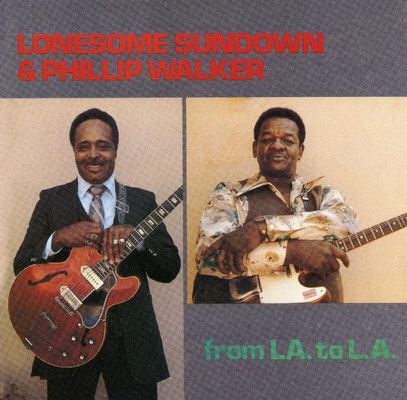
CRAWL BACK TO LOUISIANA
P-Vine
April 1977
FROM LA. TO L.A.
Rounder
April 1977 / November 1979
On trouve ici cinq morceaux inédits issus de la séance d'avril 1977 et d'une autre séance de novembre 1979 : "Steppin' up in class" un superbe duo avec son ami Phillip Walker, "Gloria Belle", le slow blues "My bad habit" dans lequel il est uniquement chanteur, le somptueux "This is the blues" et "Crawl back to Opelousas".
Here we find five unreleased tracks from the april 1977 session and another november 1979 session : "Steppin' up in class" a superb duet with his friend Phillip Walker, "Gloria Belle", the slow blues "My bad habit" in which he is only a singer, the sumptuous "This is the blues" and "Crawl back to Opelousas".